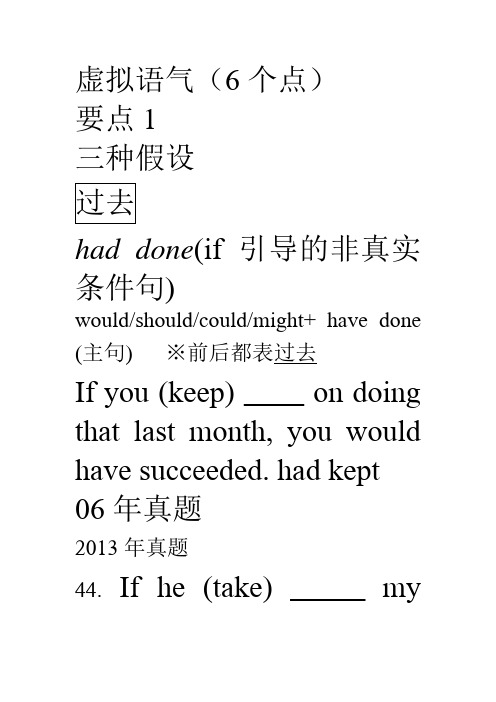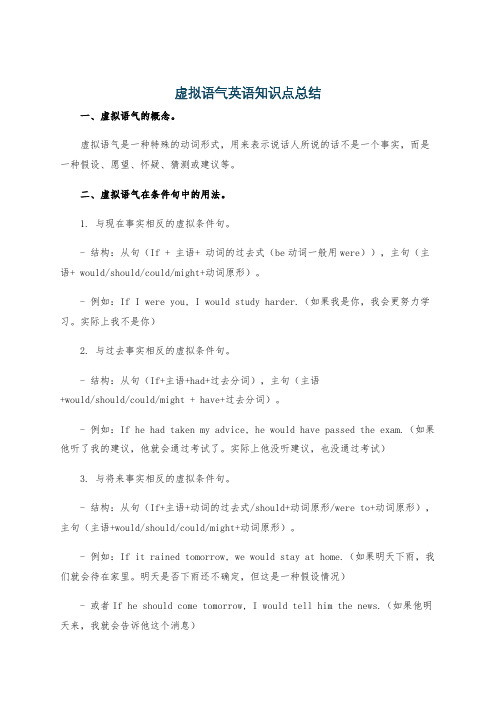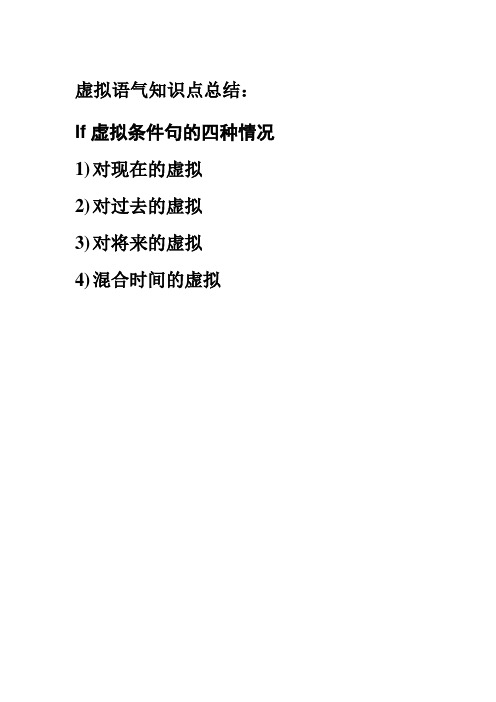专升本英语虚拟语气重点
- 格式:docx
- 大小:14.93 KB
- 文档页数:2

英语语法虚拟语气的知识点归纳一、虚拟条件句(一)含有if条件句的主从句的虚拟语气总结:1. If 条件句中谓语动词的虚拟结构是在原来陈述语气所用时态的基础上倒退一个时态(对将来虚拟的were to do/should do例外)2. 主句要借助于情态动词的过去式,后跟动词原形(现在或将来)或have done(过去);if条件句中只出现一个情态动词,即对将来虚拟的should.3.做此类题目时一定要分清是从句还是主句谓语动词的虚拟,还要把握好时态。
注意:1. 在虚拟条件从句中,动词“be”的过去时态一律用”were”,不用was。
2. 在虚拟条件状语中如果有were, should, had这三个词中任何一个,可省略if,把这三个词提到主语之前, 变成:were/should/had +主语+剩余成分。
3.在虚拟条件状语从句中,省略连词的倒装形式的句首不能用动词的缩略形式。
如我们可说Were I not to do., 而不能说Weren‘t I to do。
4.在表示与将来事实相反的条件句中,只能用should,而不能用would,could和might 等。
5.主句中的should通常用于第一人称,would,could以及might 可以用于各种人称eg :①If I were a bird, I could fly in the air.如果我是一只小鸟,我就能在空中飞行。
②I wish I could pass the examination.我希望我能通过考试。
在虚拟条件句中,对于与将来事实相反的情形,请注意以下几点:(1)条件从句表示的内容与将来事实相反,实为对将来情况的推测,用过去时表示虚拟;(2)条件从句谓语除用过去式外,有时也用“should+动词原形(表示可能性极小,常译为“万一”)”或“were to+动词原形(表示与将来事实相反的假设)”;(3)条件从句使用“should+动词原形”这样的谓语形式时,主句谓语除可用“should (would, could, might)+动词原形”这样的虚拟语气形式外,也可用直陈语气或祈使语气。

(完整版)英语虚拟语气语法归纳总结英语中的虚拟语气是一种表示非事实或想象的语气,用来表达对现实情况的猜测、愿望、要求、建议、命令和反讽等。
虚拟语气主要通过动词的形式和句子的结构来表达。
一、虚拟语气的用法:1.表达建议、要求、命令、禁止:- 主语+动词原形+宾语(动词原形要用动词底形、如be);- 主语+动词原形+that从句(用于表达建议、命令、禁止,动词原形用“should + 动词原形”或用情态动词)。
例句:- It is important that he be present at the meeting.(建议)- I suggest that he should go to the doctor.(建议)- They insisted that he leave the room immediately.(命令)2.表达愿望、请求、要求:-主语+动词过去式;- 主语+would/could/might + 动词原形;- 主语+动词过去式+宾语+should + 动词原形。
例句:- I wish I could fly.(愿望)- I would appreciate it if you could help me.(请求)3.表示虚拟条件:- If条件从句中的谓语动词用过去完成时,主句用would/should/might/could + have + 过去分词;- If条件从句中的谓语动词用过去时,主句用would/should/could + 动词原形。
例句:- If I had known his phone number, I would have called him.(虚拟条件)- If you had listened to me, we could have finished the project earlier.(虚拟条件)4.表达建议、要求、祝愿:- If only内部称述 + 主语 + 过去式。

虚拟语气(6个点)要点1三种假设had done(if引导的非真实条件句)would/should/could/might+ have done (主句) ※前后都表过去If you (keep) ____ on doing that last month, you would have succeeded. had kept 06年真题2013年真题44.If he (take) _____ myadvice at that time, he would have got the job he applied for. had takenBe—were (非真实条件句) Do—didwould/could/might/should+动词原形(主句)If I were you, I would study hard.If I had time now, I would go out.were to+动词原形(if从句)should+动词原形would/could/might/should+动词原形(主句)If I were to have time tomorrow morning, I would stay at home.要点2 if的省略如果if 从句中有were/should/had, if可省,were/should/had提到主语之前Were I you, I would study hard.要点3以下5种情况用“(should)+动词原形”的虚拟语气情况一:表建议、命令、要求等动词后的move建议propose提议,建议-proposal(名)insist坚决要求suggest建议;暗示(宾从用陈述语气)His pale face suggests that he (be) ____ ill. isDon’t worry about her. Her rosy cheeks suggest that she___ in good health.08年真题A) be B)isC) were D) was情况二:It be +引起虚拟形容词或表建议、命令、要求等动词的过去分词+常考引起虚拟的形容词:advisable可行的;important;desirable合心意的;essential基本的,strange 奇怪的,natural自然的,vital非常重要的,urgent 紧急的,necessary必要的表建议、命令、要求等动词的过去分词:required, suggested, recommended, requested, ordered…2013年真题It is important that we ___ the task ahead of time.A.will finishB. finishedC. finishD. shall finish 情况三:表建议、命令、要求,愿望、主张等名词后的表语从句或同位语从句order, request, requirement, proposal, advice,recommendation, demand, suggestion, necessity, desire, idea……情况四动词+it(形宾) +引起虚拟的形容词(宾补)+宾从【(should)+动词原形】情况五:in case (以防);for fear that=lest唯恐,其后的从句中※注意事项:1)should+动词原形2)动词原形:am/is/are/was/were—be (动词原形)实义动词原形指的是动词未做任何改变(不受主语和时态的制约)It is important that he (finish) _____ the task we have given him today. finish06年真题He suggested that Mary (finish) ___ her homework on time.We propose that he (be)____ at home on weekends.※3)主谓关系:主动关系被动关系(be +过去分词)Our teacher suggested that our homework (hand) ___ in before Friday. be handedbe+形容词=be of+名词The book is very useful.The book is ___ ___ ___.Of great useHe required that we (present) ____ at the meeting on time. be presentHe put forward a (propose) ___ at the meeting. Propose-proposal (名)要点4以下5种情况时态根据需要后退一个情况一该是…时候了a. It is time for+名词b. It is time to do…c. It is (about/high) time+句子It is time we took effective measures to stop airpollution.2009年真题It’s high time we ___ something to stop road accident.A. didB. are doingC. will doD. do情况二wish+宾从(假设,用虚拟语气)情况三would rather+句子(现在或未来时间状语,用一般过去时;过去时间状语,用过去完成时)be involved inbe involved inmake comment on…对…进行评论情况四If only(但愿,要是…多好!)+句子If only I (not lose) ___ my wallet yesterday!had not lost情况五as if=as though+句子(假设,如用be的过去式,无论主语是什么,用were)The little Chinese boy speaks English very well as if he (be) ___ an American. wereThe milk tastes as if it (be) __ sour. is要点5时间上混合的虚拟语气If I had slept a little earlier last night, I would not feel sleepy now.要点6Besides (learn) ___ English, I also learn Japanese.Despite=in spite of尽管+名词/the fact that 句子………, I still went to school as usual.1. Despite=In spite of my illness2. Despite=In spite of the fact that I was ill3. Although I was ill1)介词等暗示出非真实条件with, without, but for___ their help, I could have succeeded in the experiment yesterday.A. But forB. DespiteC. Because ofD. In case of2)but; or/or else/otherwise 可暗示出非真实条件句。

虚拟语气的考点为:would rather+that从句+一般过去时:It is vital/necessary/important/urgent/imperative/desirable/advisable/natural/essential+that+动词原形;It is time/abouttime/high time+that+一般过去时:proposal/suggestion+that+动词原形;lest+that+should+动词原形;if only+that+would+动词原形。
1. 真实条件句真实条件句用于陈述语气,假设的情况可能发生,其中if是“如果”的意思。
句型:从句:If + 主语+ 一般现在时主句:主语+ shall/will +动词原形eg: The volleyball match will be put off if it ___.A. will rainB. rainsC. rainedD. is rained注意:1)在真实条件句中,主句不能用be going to表示将来,应该用shall, will.(F) If you leave now, you are going to regret it.(T) If you leave now, you will regret it.2)表示真理时,主句谓语动词便不用shall (will) +动词原形,而直接用一般现在时的动词形式。
2.非真实条件句(虚拟语气)时态:可以表示过去,现在和将来的情况。
⏹ a. 表示与现在事实相反的虚拟语气。
句型:从句:If + 主语+动词的过去式(be 动词用were)主句:主语+should/ would/could/might +动词原形eg:If they were here, they would help you.If I were you,I would study hard.⏹ b.表示与过去事实相反的虚拟语气。

虚拟语气英语知识点总结一、虚拟语气的概念。
虚拟语气是一种特殊的动词形式,用来表示说话人所说的话不是一个事实,而是一种假设、愿望、怀疑、猜测或建议等。
二、虚拟语气在条件句中的用法。
1. 与现在事实相反的虚拟条件句。
- 结构:从句(If + 主语+ 动词的过去式(be动词一般用were)),主句(主语+ would/should/could/might+动词原形)。
- 例如:If I were you, I would study harder.(如果我是你,我会更努力学习。
实际上我不是你)2. 与过去事实相反的虚拟条件句。
- 结构:从句(If+主语+had+过去分词),主句(主语+would/should/could/might + have+过去分词)。
- 例如:If he had taken my advice, he would have passed the exam.(如果他听了我的建议,他就会通过考试了。
实际上他没听建议,也没通过考试)3. 与将来事实相反的虚拟条件句。
- 结构:从句(If+主语+动词的过去式/should+动词原形/were to+动词原形),主句(主语+would/should/could/might+动词原形)。
- 例如:If it rained tomorrow, we would stay at home.(如果明天下雨,我们就会待在家里。
明天是否下雨还不确定,但这是一种假设情况)- 或者If he should come tomorrow, I would tell him the news.(如果他明天来,我就会告诉他这个消息)- 以及If I were to see her tomorrow, I would give her the book.(如果我明天见到她,我就会把书给她)三、虚拟语气在宾语从句中的用法。
1. wish后的宾语从句。
- 表示与现在事实相反的愿望,从句谓语动词用过去式(be动词用were)。

虚拟语气知识点总结:If虚拟条件句的四种情况1)对现在的虚拟2)对过去的虚拟3)对将来的虚拟4)混合时间的虚拟5)具体运用If虚拟条件句的省略和倒装If引导的虚拟条件句中,如果出现了were, had, should, 则需将if省略,把were, had, should 提前;如果有否定词not, not留在原地,位置不发生变化。
虚拟语气的八种运用下列单词的动词,形容词,名词词性所引导的从句中,谓语动词用should+动词原形,should 可省略1)demand, suggest(建议), insist(坚持要求), order, propose, require, request,command, recommend, decide, ask2)necessary, important, essential,advisable, strange, desirable(值得有的,合意的), vital, ordered, suggested,decided, arranged, proposed,recommended, demanded3)suggestion, proposal, order, instruction,advice, request, demandwish1)与现在相反,从句动词用过去式Iwish I were as young as you.2)与过去相反,从句动词用过去完成式Iwished I hadn’t made that mistake.3)与将来相反,从句动词用过去将来式We wish we could fly to the Mars in thefuture.if only1)用法同wish2)与only if的区别A.Only if: 决不。
除非。
;(rather formal) used to state the onlysituation in which something canhappenB.I’ll come only if you promise me thatyou won’t invite Tom.Only if a teacher has given permissionis a student allowed to leave the room. would rather/sooner1)与现在或将来相反,从句动词用过去式I would rather I went now.2)与过去相反,从句动词用过去完成式Iwould rather you had left yesterday.as if/though1)与现在事实相反,从句动词用过去式She looks as if she were sick.2)与过去事实相反,从句动词用过去完成式He talked about Tom as if hehad seen him.3)与将来事实相反,从句动词用过去将来式It looks as if it might rain.It is (about/high) time + that 从句从句中谓语动词用过去式。
模块二:虚拟语气1、虚拟语气的三大范围:(1)、表达的假设与事实相反;(2)、表达的是异想天开、几乎无法实现的愿望;(3)、表示的是建议、命令、要求、请求等语气。
气。
2、在虚拟语气中不用was,用were3、有的时候一个句子中将were、had、should等置于句首而省略IF,这时主谓要部分倒装。
Eg. Were you in my position, what would you do?(与现在事实相反)原句:if you were in my position, what would you do?Had he taken your advice, he would have passed the exam.(与过去事实相反)原句:If he had taken your advice, he would have passed the exam.Should it rain tomorrow, the meeting would be postponed.(与将来事实相反)原句:If it should rain tomorrow, the meeting would be postponed.考点二:在表示“建议、命令、要求、请求等语气的词语后的that 从句中用should +do should 可以省略常考的词有:suggest order demand insist propose request require necessary Eg. She insisted that the seats (should) be booked in advance.The workers demanded that theirs wages be raised by 10 percent.注:有的词由于有多重意义,我们通常称之为词妖:尤其要注意的有:(1)、suggest:1、建议,that 从句后用虚拟语气;2、暗示that 从句后不用虚拟语气。
英语《虚拟语气》语法知识总结归纳虚拟语气(Subjunctive mood)是英语中一种特殊的语气形式,用于表示说话人的假设、愿望、建议、要求、命令等非真实情况。
虚拟语气在句子中通常与动词的调整和语法结构上的变化相关。
以下是对虚拟语气的语法知识的总结归纳:1.条件句中的虚拟语气:1.1 条件句中表示对现在的假设:使用虚拟语气的一般公式是:if + 主语 + 过去式,主句使用would/could/should/might + 动词原形。
例如:- If I were you, I would go to the meeting.(如果我是你,我会去开会。
)注意,这里的"were"是一个特殊的虚拟语气形式,用于所有人称和数。
- If she had studied harder, she might have passed the exam.(如果她努力学习,她可能会通过考试。
)1.2 条件句中表示对过去的假设:使用虚拟语气的一般公式是:if + 主语 + 过去完成时,主句使用would/could/should/might + have + 过去分词。
例如:- If I had known it, I would have told you.(如果我知道了,我会告诉你的。
)- If she had arrived earlier, she might have caught the bus.(如果她早点到,她可能会赶上公共汽车。
)2.虚拟条件句中的特殊情况:2.1 在虚拟条件句中表示命令、建议时,主句中的动词可以使用动词原形(而不是would/could/should/might + 动词原形)。
例如:- If you have any questions, please let me know.(如果你有任何问题,请告诉我。
)- If I were you, I would take a break.(如果我是你,我会休息一下。
2022年专升本英语虚拟语气知识点详解(一)基本概念:1. 语气:是谓语动词的一种形式,表明说话的目的和意图。
2. 种类:英语中有四种语气,分别是陈述语气、疑问语气、祈使语气和虚拟语气。
⑴陈述语气:陈述一个事实或提出一个想法。
例如:China is a great socialist country.⑵疑问语气:用来提出问题。
例如:Have you ever been to Japan?⑶祈使语气:向对方提出请求、邀请,给予忠告、指示、警告和发出命令等。
例如:Come and join us.⑷虚拟语气:表示一种纯然假想的情况或者主观愿望。
例如:If he had a permit he could had a job.3. 虚拟语气的形式:⑴现在虚拟语气:一般用动词原形来表达。
例如:God bless you.It is essential that the ban is lifted.She petitioned the king that her father be pardoned.⑵过去虚拟语气:和陈述语气的过去时相同,但动词be 要用were 形式。
例如:Imagine your child got lost.She treated me as though I were a stranger.If only I were not so nervous.(3)过去完成形式的虚拟语气:和陈述语气中的过去完成时相同。
例如:I wish I hadn’t done so.If I had seen her, I would have told her.If only I had listened to your advice.(二) 用法:1. 虚拟语气在条件状语从句的运用:⑴一般条件状语从句与虚拟条件状语从句的比较:例如:①If she invites me tomorrow, I shall go to the party. 这是个一般条件状语从句,主句谓语动词用一般将来时,从句谓语动词用一般现在时。
专升本虚拟语气的用法归纳虚拟语气在专升本英语考试中是一个重要的语法点,其用法可以归纳如下:1. 虚拟现在时:表示与现在事实相反的情况。
从句用“if+主语+动词的过去式(be 动词用were)”,主句用“主语+would+动词原形”。
例句:If I were you,I would take an umbrella. 如果我是你,我就会带把伞。
2. 虚拟过去时:表示与过去事实相反的情况。
从句用“if+主语+had+过去分词”,主句用“主语+would+have+过去分词”。
例句:If you had come yesterday,you would have seen him. 如果你昨天来了,你就会看见他。
3. 虚拟将来时:表示与将来事实相反的情况。
从句用“if+主语+would/might/could+动词原形”,主句用“主语+would/might/could+动词原形”。
例句:If you might leave now,I would be able to finish the work before dark. 如果你现在离开,我能在天黑之前完成工作。
4. 含蓄虚拟语气:从句用介词短语、副词或非谓语动词来表示,主句不用虚拟语气。
例句:One can’t succeed without hard work. 没有努力就不能成功。
(without hard work=if there were no hard work)5. 混合虚拟语气:一个句子中主句和从句分别表示对现在、过去或将来的虚拟。
例句:I would write to her if I had your address. 我要有你地址的话,我会给她写信的。
(从句与现在事实相反,主句与过去事实相反)在考试中,注意审清题目的要求,细心分析语境,合理判断时态和语态的使用。
以上内容仅供参考,如需更多关于虚拟语气的用法归纳,可以查阅专升本英语教辅练习书获取更全面和准确的信息。
专升本英语虚拟语气重点:
1,If were you,I would/could/should do study hard 如果我是你,我就努力学习
2,If I had a chance ,I would/could/should study hard 如果我现在有一个机会,我一定要努力学习
(与现在事实相反)
3,If I had finished my work ,I would/could/should have been better 如果我以前完成我的工作,我就能更好。
(与过去事实相反)
4,If it rained tomorrow,I would/could/should stay at home 如果明天下雨,我将会待在家里。
5,If it should rain tomorrow ,I would/could/should stay at home
6,If it were to rain tomorrow,I would/could/should stay at home
(与将来事实相反)
7,Were it to rain tomorrow,I would/could/should stay at home 如果明天下雨,我将待在家里
8,Had it rain yesterday,I would/could/should have stayed at home 如果昨天下雨,我将待在家里
9,Should it rain tomorrow,I would/could/should stay at home 如果明天下雨,我将待在家里。
10,If I were you ,I would have stayed at home yesterday 如果我是你,我昨天就在家待着。
(混合虚拟语气)
11,It is + 形容词(命令,要求,建议,决定,主张)that +从句(should+动词原形,should可以省略)例如:insistent坚持的,adamant坚定的,imperative必要的,preferable 更好的,compulsory必修的,vital 至关重要的,等等形容词)
It is important that you(should)study hard 你应该好好学习是多重要
12,在宾语从句中,表示命令,要求,建议,主张时也用虚拟语气,(常用动词有:propose 建议,command命令,urge 催促,等动词),从句中的should 可以省略
I advise that you (should )study hard 我建议你应该好好学习
13,I wish I hadn’t promised 我希望当初我没有许愿
14,I wish I had money 我祝愿现在就有钱
15,I wish it could /would/might rain tomorrow,我祝愿明天下雨
16,would rather,would sooner,would (just)as soon,would prefer 宁愿
I would (just)as soon you were to Beijing 我宁愿你去北京。
17,在表示建议,命令,主张,目的,计划和愿望的同位语从句中,要用虚拟语气,从句通常是should+动词原形,should 可以省略
常有的名词有:preference,prosposal,motion等名词
My proposal is that we should study hard every day 我的提议就是我们应该每天努力学习
18,He talked about Beijing as if he had been there 他谈论北京感觉自己好像去过
19,He speaks as if he were a local man 他说话好像自己就是当地人一样
20,He opened his mouth as if he would say something他张开嘴好像他想要说什么
21,He started doing his homework lest he should be punished 他开始做他的作业,以防被惩罚
22,He ran away for fear that he should be seen 唯恐被人发现,他逃跑了
23,But for water= (if it were not for water),nothing should be survived 要是没有水,没有
生物能存活。
24,Without you(if you hadn’t been with me),I wouldn’t have done my work 以前要是没有你,我就不能完成我的工作了。
25,I could carry the box but I am so fat 我可以搬动这个盒子,但是我太胖了
26,They would have resisted but that they lacked courage 要不是缺乏勇气,他们会抵抗的27,It’s high time that you should take your temperature 该你量体温的时候了。
28,If only I were you 要是我是你就好了。
29,If I had finished my work last week 要是我上周完成了我的工作就好了。
30,He had a cold ,otherwise he would have been the party last night 他昨天感冒了,否则他就会参加昨晚的聚会了。